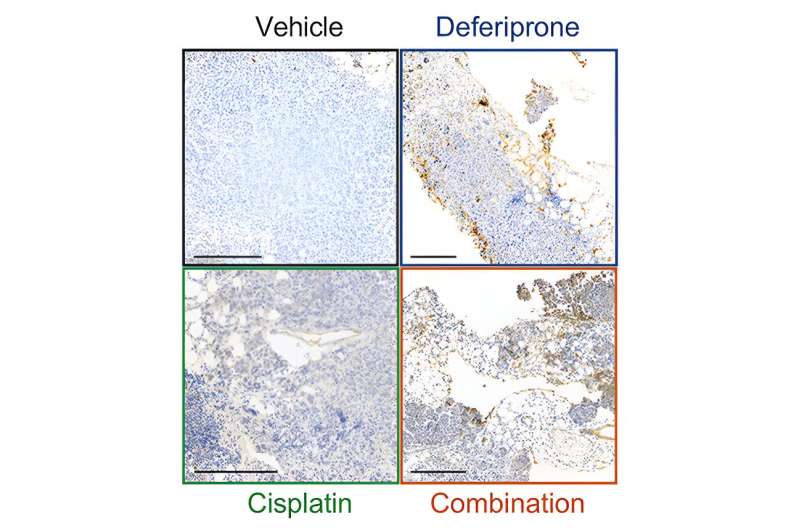This article has been reviewed according to Science X's editorial process and policies. Editors have highlighted the following attributes while ensuring the content's credibility:
fact-checked
peer-reviewed publication
trusted source
proofread
Preclinical study explores approved drug for ovarian cancer

An iron-binding drug that is already approved for treatment of other diseases could provide a novel way to attack ovarian tumors, according to a new study led by Weill Cornell Medicine researchers. The preclinical study, which combined the analysis of human ovarian tumors and animal models of the disease, was published on July 29 in Cancer Discovery.
Iron is essential for multiple cellular processes, so actively multiplying cancer cells often need larger amounts of it than normal cells. That's especially true in ovarian cancers.
"We thought that was a perfect opportunity to try a new approach, because there is an FDA-approved iron-chelating drug called deferiprone that has been successfully used for other diseases with abnormal iron accumulation," said senior author Dr. Juan Cubillos-Ruiz, the William J. Ledger, M.D., Distinguished Associate Professor for Infection and Immunology in Obstetrics and Gynecology at Weill Cornell Medicine. Iron-chelating drugs bind tightly to iron, preventing cells from using it.
To confirm the importance of iron in ovarian cancer, Dr. Cubillos-Ruiz's team first looked at a collection of human tumor samples they've amassed over the past decade and analyzed public genomic datasets from ovarian cancer patients with the help of an international team of collaborators.
"We can isolate different components of tumors from ovarian cancer patients, and study their molecular processes," said Dr. Cubillos-Ruiz, who is also co-leader of the Cancer Biology Program in the Sandra and Edward Meyer Cancer Center at Weill Cornell Medicine.
The scientists found that ovarian cancer cells demonstrate increased expression of iron-related genes, which correlated with poor patient prognosis. The investigators also found that fluid surrounding ovarian tumors contains high iron content that is readily available to cancer cells.
The investigators next looked at animal models of the disease.
"We have advanced mouse models of metastatic ovarian cancer that are immunocompetent, so this allows us to study the immune system response in the disease, which is a crucial component," Dr. Cubillos-Ruiz said. Previous iron-related studies have used mice with compromised immune systems, precluding the understanding of how different therapies affect immune responses to tumors.
The investigators found that the mice recapitulated the disease features quite well: as ovarian cancer progressed, there was more iron accumulation in the tumor, and the cancer cells selectively over-expressed the iron-related gene signatures.
In the animals, deferiprone treatment worked even better than cisplatin, the current standard for ovarian cancer chemotherapy, and functioned directly inside the cells. "We demonstrated that deferiprone can chelate iron in ovarian cancer cells, in vivo," said lead author Dr. Tito Sandoval, a former postdoctoral fellow in Dr. Cubillos-Ruiz's lab.
"We found that combining cisplatin and deferiprone markedly extended the survival of mice with metastatic ovarian cancer, working synergistically compared with the monotherapies," said Dr. Sandoval, who is now a senior scientist in radiation oncology at Washington University School of Medicine in St. Louis. "So, we decided to identify the mechanisms behind this effect."
The team found that by starving cancer cells of iron, deferiprone triggers a cellular stress response, which prompts the immune system to attack them. Cisplatin affects cancer cell DNA replication, so the two drugs appear to be complementary.
Dr. Cubillos-Ruiz is now working with clinical collaborators to design human trials of the new approach. Though deferiprone is already approved for treating other conditions, he emphasized that the team still needs to determine the best way to use it against ovarian cancer. "We want to maximize the potential therapeutic effects, so the clinical trial design is critical," he said.
More information: Tito A. Sandoval et al, Iron Chelation Therapy Elicits Innate Immune Control of Metastatic Ovarian Cancer, Cancer Discovery (2024). DOI: 10.1158/2159-8290.CD-23-1451



















